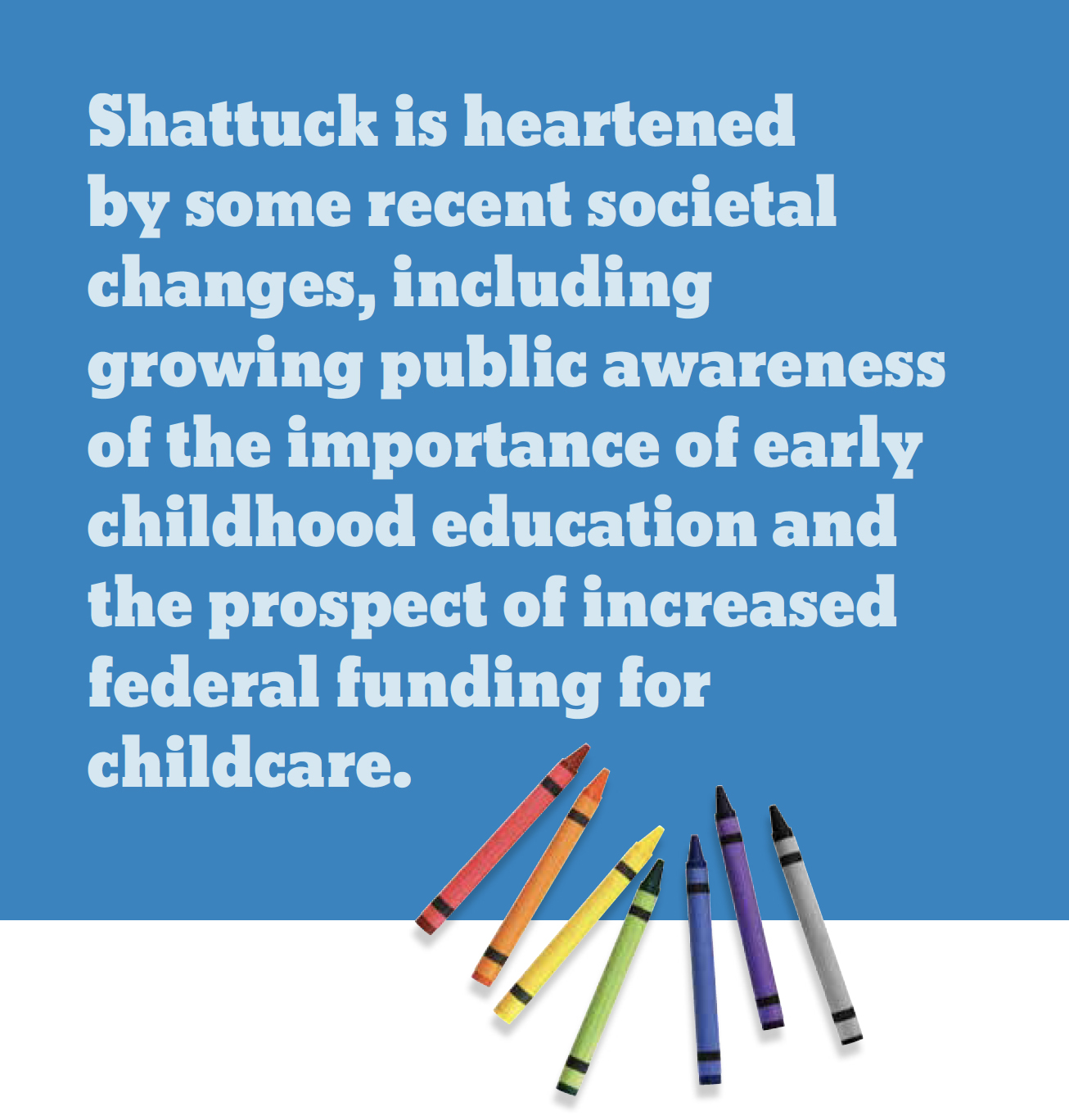School Work

As an advocate for early childhood education and as a nonprofit management consultant, Carol Shattuck has helped others combine good intentions with good leadership.
Carol Shattuck ’82 has spent her career working with mission-driven organizations. So it seems only fitting that she was on a mission of her own when she came to Rice Business to pursue a Master of Business and Public Management degree.
A Houston native, Shattuck began volunteering at local community organizations while still in middle school, and after graduating from Duke University with a degree in psychology and public policy, she spent two years working for nonprofits in Washington, D.C. Her experience there taught her that while nonprofit administrators often earn their positions by virtue of their talent and their passion for the cause, they often lack the training to excel in the executive suite, a problem that Shattuck sums up as “good hearts, but not necessarily good management skills.”
Shattuck wanted to change that — first by acquiring those skills herself, and then by helping others to do the same.
The MBPM program, then in its infancy, helped her with the first step, providing her with a solid grounding in everything from economics to strategic planning — all of which she put to good use at her first job after graduation. As a staff consultant at the Support Center of Houston, a nonprofit dedicated to improving the effectiveness of other nonprofits, Shattuck worked with clients on management issues, organized training sessions for their staff, and otherwise helped them strengthen their institutions.
 She did something similar as an assistant vice president at United Way of the Texas Gulf Coast (now the United Way of Greater Houston), where in addition to working on strategic planning and board development for the organization itself, she created the Management Assistance Program. Known today as Nonprofit Connection, the program has for more than 30 years helped the volunteers and professional staff of nonprofit agencies become more effective and efficient at delivering services with limited resources.
She did something similar as an assistant vice president at United Way of the Texas Gulf Coast (now the United Way of Greater Houston), where in addition to working on strategic planning and board development for the organization itself, she created the Management Assistance Program. Known today as Nonprofit Connection, the program has for more than 30 years helped the volunteers and professional staff of nonprofit agencies become more effective and efficient at delivering services with limited resources.
All that experience came in handy when Shattuck decided to launch her own consultancy in 1994. She made the move so she could spend more time with her family — she and her husband, David, a professor of engineering at the University of Houston, had a son and daughter in middle school at the time — but she hardly slowed down. Among her various projects, Shattuck helped launch and run Communities Conquering Cancer, a collaborative venture led by St. Luke’s Health and the Kelsey-Seybold Clinic that provided free mammograms and arranged follow-up care for medically underserved women in Houston’s Acres Homes neighborhood.
Shattuck also worked with the Greater Houston Community Foundation, which hired her to consult on a couple of initiatives focused on early childhood education. That experience ultimately led her to become head of the Greater Houston Collaborative for Children, an alliance of foundations devoted to fostering healthy child and family development, in 1998.
Six years later, Shattuck would lead the organization through a merger, shortening its name to Collaborative for Children and broadening its mission to include serving families with young children, improving the quality of early education, and strengthening the system of early childcare. By the time she stepped down as president and CEO in 2018, the organization had become one of the leading nonprofits in the greater Houston area focused on improving the lives of children under 5, with more than 85 personnel and an annual budget in excess of $10 million.
Shattuck’s tenure at the Collaborative coincided with the dissemination of the first rigorous scientific studies to demonstrate the positive impact that early childhood education has over the course of an individual’s life, and she was quick to act on the data. In addition to establishing information and referral services (first a telephone hotline, later an online database) for parents seeking quality childcare in their neighborhoods, Shattuck strengthened the training that the organization offered to parents of young children and worked with state agencies such as the Texas Workforce Commission to close the gap between what the state required of childcare centers and what research indicated was necessary for high-quality childcare.
She also spearheaded an intensive effort to improve access to good early childhood education in underserved neighborhoods. In 2008, for example, Shattuck launched a program called College Bound from Birth in Sunnyside, an historically Black and economically disadvantaged neighborhood south of downtown. The program, which has since expanded to several other neighborhoods, provides everything from professional development for teachers to mentoring services, curriculum development and classroom materials to childcare centers in areas where quality childcare has traditionally been hard to find.
“It was a real joy to be a part of that process,” says Shattuck, who describes the “night and day difference” she and her colleagues saw from year to year in the centers they supported.
Shattuck is heartened by some of the broader societal changes she witnessed during and after her time at the Collaborative, such as growing public awareness of the importance of early childhood education and the prospect of increased federal funding for childcare.
Yet now that she is back running her own consultancy, Shattuck Consulting LLC, for the second time in her career, Shattuck has returned to her roots: She’s focusing on areas that, in her experience, have the greatest impact on a nonprofit’s success — scenario planning (for quick pivots in a fast-changing operating environment), strategic planning, and board of directors development and training. For example, she recently helped develop a strategic plan for the Houston Area Urban League, an organization that provides social services such as housing and workforce training in economically disadvantaged areas across greater Houston.
There are differences, to be sure, between the pre- and post-Collaborative iterations of Shattuck’s consultancy.
On the one hand, the confluence of challenges that mission-driven organizations currently face — an ongoing pandemic, continued economic uncertainty, a national reckoning on race relations — demands a whole new level of nimbleness and flexibility.
On the other, Shattuck now brings to the table 20 years of lessons learned as head of a major nonprofit — lessons she can draw on to help others navigate these troubled times.
Yet some things have remained constant; namely, the rigorous approach to problem-solving that she acquired at Rice, and which helped her not only steer her own organization but also guide others as they have sought to make the world a better place.
“My training at Rice was critical,” she says. “It truly opened the door to the career that I had.”


